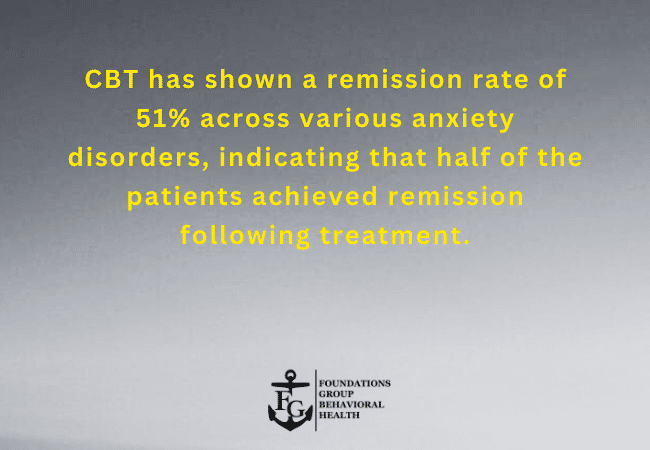Mental health conditions such as anxiety, depression, trauma, and co-occurring disorders can significantly impact daily life, relationships, and overall well-being. One of the most effective and widely used treatments for these conditions is Cognitive Behavioral Therapy (CBT).
CBT is a structured, goal-oriented form of therapy that focuses on identifying and changing negative thought patterns and behaviors. It is used in various Mental Health Treatment Programs, including Psychiatric Day Treatment, Half-Day Treatment, and Outpatient Mental Health Programs in Massachusetts.
At Foundations Group Behavioral Health, we integrate CBT into our evidence-based therapy programs, helping individuals develop effective coping strategies, enhance emotional resilience, and regain control over their lives.
This guide explores the benefits of Cognitive Behavioral Therapy (CBT), how it works, its role in different mental health disorders, and how it fits into structured treatment programs.
Understanding Cognitive Behavioral Therapy (CBT)
CBT is a short-term, structured therapy that helps individuals:
- Recognize and challenge negative thinking patterns.
- Replace self-destructive behaviors with healthier responses.
- Develop practical skills to cope with emotional distress.
- Improve decision-making and emotional regulation.
CBT is highly effective for treating a wide range of mental health conditions, making it a core component of our Mental Health Therapy Programs in Massachusetts.
How CBT Works: Core Principles and Techniques
CBT is based on the idea that thoughts, emotions, and behaviors are interconnected. When individuals experience distress, their thoughts can become irrational or negative, leading to unhealthy behaviors and worsening emotional states.
Key Techniques Used in CBT:
- Cognitive Restructuring (Thought Challenging)
- Identifying negative thought patterns.
- Evaluating whether these thoughts are accurate or distorted.
- Replacing negative thoughts with more realistic, balanced perspectives.
- Behavioral Activation
- Encouraging positive activities to improve mood.
- Developing healthy routines and self-care habits.
- Engaging in activities that promote fulfillment and motivation.
- Exposure Therapy (For Anxiety & PTSD)
- Gradual exposure to feared situations or thoughts.
- Reducing avoidance behaviors to decrease fear response over time.
- Mindfulness and Relaxation Techniques
- Practicing deep breathing, meditation, and progressive muscle relaxation.
- Helping individuals stay present rather than fixating on worries or past trauma.
- Skills Training
- Learning communication techniques and emotional regulation strategies.
- Practicing assertiveness and setting healthy boundaries.
CBT for Specific Mental Health Disorders
CBT is widely recognized as an effective treatment for multiple mental health conditions.
1. CBT for Anxiety Disorders
CBT is considered the gold standard for treating generalized anxiety disorder (GAD), panic disorder, social anxiety disorder, and phobias.
- Teaches individuals to recognize anxious thoughts and challenge their validity.
- Helps reduce avoidance behaviors and irrational fears through exposure therapy.
- Encourages relaxation and coping techniques to handle stress and worry.
At Foundations Group Behavioral Health, our Anxiety Treatment Program in Massachusetts uses CBT-based interventions to help individuals manage their anxiety effectively.
2. CBT for Depression and Mood Disorders
Depression often involves negative thinking patterns that keep individuals stuck in a cycle of sadness and hopelessness.
- CBT helps individuals reframe negative thoughts and replace them with positive, constructive beliefs.
- Encourages behavioral activation to increase engagement in enjoyable and meaningful activities.
- Supports developing problem-solving skills to handle life’s challenges more effectively.
CBT is a foundational part of our Depressive Disorder Treatment Program in Massachusetts, helping individuals regain emotional balance.
3. CBT for PTSD and Trauma-Related Disorders
For individuals recovering from trauma and post-traumatic stress disorder (PTSD), CBT offers evidence-based treatments such as:
- Cognitive Processing Therapy (CPT): Helps individuals reframe their beliefs about trauma.
- Prolonged Exposure Therapy: Reduces fear responses by gradually confronting traumatic memories.
- Mindfulness-Based Stress Reduction: Teaches techniques to manage distressing emotions and intrusive thoughts.
At Foundations Group Behavioral Health, we integrate CBT into our Trauma Disorder Treatment Program in Massachusetts, offering structured trauma recovery support.
4. CBT for Co-Occurring Disorders
CBT is also effective in treating co-occurring mental health and substance use disorders.
- Helps individuals recognize triggers that lead to unhealthy behaviors.
- Develops healthier coping strategies to replace substance use.
- Encourages long-term relapse prevention strategies.
Our Co-Occurring Disorder Treatment Program in Massachusetts incorporates CBT to help individuals achieve and maintain recovery.

CBT in Different Levels of Mental Health Care
1. Psychiatric Day Treatment Massachusetts
- Offers daily CBT-based therapy sessions for individuals needing intensive mental health support.
- Integrates individual, group, and family therapy into treatment plans.
- Includes medication management and holistic interventions.
2. Half-Day Treatment Program Massachusetts
- Provides structured CBT sessions with greater flexibility for those transitioning from inpatient care.
- Focuses on developing long-term coping mechanisms and independent recovery strategies.
- Supports individuals in resuming work, school, or daily activities while receiving structured therapy.
3. Outpatient Mental Health Program Massachusetts
- Offers weekly or biweekly CBT-based therapy sessions for long-term mental health support.
- Helps individuals apply CBT strategies in real-world situations.
- Provides ongoing monitoring and support to ensure long-term success.
At Foundations Group Behavioral Health, our CBT-based treatment plans are tailored to each individual’s unique needs.
Is CBT Right for You?
CBT is an excellent therapy option if you:
- Struggle with anxiety, depression, PTSD, or co-occurring disorders.
- Want practical, skills-based strategies for emotional regulation.
- Prefer a structured, goal-oriented approach to therapy.
- Need support in challenging negative thought patterns.
Our mental health professionals at Foundations Group Behavioral Health provide comprehensive assessments to determine if CBT is the right approach for you.
Final Thoughts
Cognitive Behavioral Therapy is one of the most effective and widely used treatments for mental health conditions. By addressing thought patterns, emotional responses, and behaviors, CBT empowers individuals to develop long-term coping strategies and improve their mental well-being.
At Foundations Group Behavioral Health, we offer CBT-based treatment in our Psychiatric Day Treatment, Half-Day Treatment, and Outpatient Mental Health Programs in Massachusetts.
If you or a loved one needs support, call us today at 888.685.9730 to learn more about how Cognitive Behavioral Therapy can help. Your journey to mental wellness starts here.
FAQ on
What is Cognitive Behavioral Therapy (CBT)?
CBT is a structured, goal-oriented psychotherapy approach that helps individuals identify negative thought patterns and replace them with healthier, more constructive ones. It is widely used for treating anxiety, depression, trauma, and co-occurring disorders.
How does CBT help with anxiety and depression?
CBT helps individuals:
- Recognize negative or irrational thoughts that contribute to anxiety and depression.
- Develop coping strategies to manage stress and emotional distress.
- Engage in positive behavioral changes to improve mood and daily functioning.
CBT is a primary treatment method in our Anxiety Treatment and Depressive Disorder Treatment Programs in Massachusetts.
Can CBT help with PTSD and trauma-related disorders?
Yes. CBT-based trauma therapy, such as Cognitive Processing Therapy (CPT) and Prolonged Exposure Therapy, helps individuals:
- Reframe negative beliefs related to traumatic experiences.
- Gradually reduce the emotional impact of traumatic memories.
- Learn mindfulness and grounding techniques for emotional regulation.
These approaches are part of our Trauma Disorder Treatment Program in Massachusetts.
Is CBT effective for co-occurring disorders?
Yes. CBT is highly effective for co-occurring mental health and substance use disorders because it:
- Helps individuals identify triggers that contribute to unhealthy behaviors.
- Teaches relapse prevention and emotional regulation strategies.
- Supports long-term mental health recovery and sobriety.
CBT is integrated into our Co-Occurring Disorder Treatment Program in Massachusetts.
What techniques are used in CBT?
CBT techniques include:
- Cognitive Restructuring – Challenging and changing negative thought patterns.
- Behavioral Activation – Encouraging positive activities to improve mood.
- Exposure Therapy – Gradually confronting fears in a safe, controlled way.
- Mindfulness and Relaxation Strategies – Managing stress and emotional distress.
How long does CBT take to be effective?
Many individuals see improvements within 10-20 therapy sessions, but treatment length depends on:
- The severity of the mental health condition.
- How consistently CBT strategies are practiced outside of therapy.
- Whether CBT is combined with medication management or other therapies.








